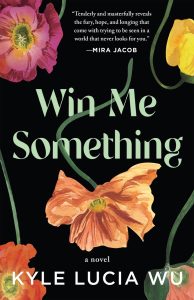Reviewed by Lily Holland

I am one to judge a book by the cover, unashamed of it too. Everything matters to me, from the artwork, the typeface, and the details of the pages. After my first attraction to a cover, I check out the summary and then look to see who the author is and what kind of writer they are. Win Me Something was an easy book to pick up. The cover was gravitating and the premise had me hooked. The inside, the content, the story that was told in the book, certainly didn’t disappoint. Win Me Something, written by Kyle Lucia Wu, is about an Asian-American girl in her twenties, living in New York City as a nanny, trying to realize her belonging and identity among a society and community of richer, whiter, and more privileged adults. Our main character, Willa Chen grew up in New Jersey, coming from a family of divorce; Now both of her parents are remarried with new families and new kids that have left Willa feeling replaced. Post grad, mid twenties, with no prospects or stable career in place, she decides to leave behind the cycle of jumping from once food service job to another in order to become a full-time nanny for a wealthy white family in Tribecca, the Adriens, caring for their daughter, Bijou. Bijou Adrien is everything and has everything that Willa longed for as a child, and continues to long for as an adult. The contrasts of their childhoods brings the realization of her loneliness and her need for self-identity to Willa’s feet. The job takes Willa into being promoted into a full-time, live-in position, deepening the relationships she creates with the Adriens and it plays a major effect on the potential of repairing the fissures within her own familial ties.
This stirring debut novel is less about coming-of-age story and more of about coming-of-adulthood. Readers are surprised by this piece of fiction with writing that is unique and intrinsic, filled with beautiful and tactile details, though, it’s simple enough for a younger audience. Words can be a bit stiff, but the language only further create Willa’s angsty tone and dissatisfaction with her life. Men and women in their twenties and thirties, struggling with self-identity, recognition, and the unknown of the future would find solace and relatability with the main character’s story. It’s also wonderful for many readers of color and those within the Asian and Asian-American communities, to see such glowing and relatable representation in media such as this. This book is for anyone who is wondering, like Willa Chen, where their place is in the world and what it really means to belong. Will spends the whole book trying to realize these answers and define her own life in the world she’s living in.
Not only was I fascinated by Willa’s personal journey, but I enjoyed seeing the bond formed between her and her charge, the impressive and young, Bijou Adrien. There’s an envy for the child’s life; Just as she is seen and understood by her parents, Willa longs to be seen and understood as well, especially by her family. Yet a natural friendship forms between the unlikely pair as they explore gourmet cooking and yoga in the penthouse foyer. I personally loved the book being written in first person. We have the honor of knowing Willa’s thoughts, fears, desires, and hesitations. It does, however, prevent the character’s flaws from being too noticeable. Willa is a docile woman, maybe a little too afraid to stand up for herself, used to being the “other” in any room she takes a part of. She faces daily, subtle and not-so-subtle racist remarks and microaggressions, that she allows to just roll off her back, but they are constantly fueling her insecurities, adversities, and afflictions. Perhaps her passivity keeps her voice from being heard. Perhaps she doesn’t feel seen because she’s spent her whole life avoiding being seen in certain lights. Another fascinating relationship within the story is the one between Willa and her boss, Nathalie. Bijou’s mother becomes a prime example for what a mother should be for Willa. She sees Bijou being known so well by her parents and waking up daily “in the lemon glow” of their attention. Growing closer with Nathalie causes Willa to trace back her wandering for belonging through memories of growing up in two different households.
Kyle Lucia Wu unpacks the issues of identity and feeling out-of-place in a way I’ve never encountered in another book like this before. This impressive novel allowed me to see parts of myself in parts of Willa Chen, as I also reflected on my own familial hurts and challenges with identity. I enjoy the “nanny” premise, as it’s a part of the reason I was delighted to read it. If you’re a reader who enjoys the pace and language of Sally Rooney novels or Such a Fun Age by Kiley Reid, this is a book to consider adding to your shelf. It provokes powerful emotional responses to even the slightest and minute interactions involving the main character, as well as self reflection and introspective interrogation.
